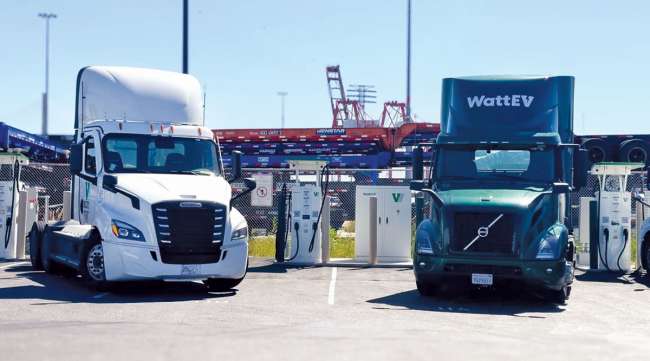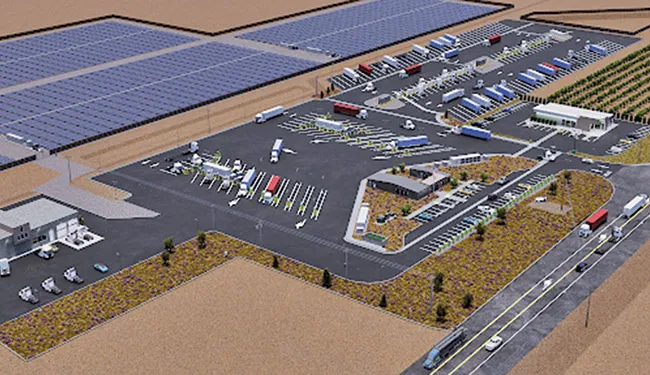Staff Reporter
WattEV’s Bakersfield Battery-Electric Charging Depot Opens

[Stay on top of transportation news: Get TTNews in your inbox.]
WattEV opened a battery-electric charging depot in Bakersfield, Calif., on May 6, its largest yet, the company said.
The Bakersfield depot, WattEV’s fourth facility, offers charging on lanes connecting the San Joaquin Valley’s agricultural sector and growing warehousing complexes to ports and other inland destinations, the Long Beach, Calif.-based company said.
California is the top state in the United States by agricultural output, according to federal data. The San Joaquin Valley includes all or part of eight California counties: San Joaquin, Stanislaus, Merced, Fresno, Madera, Kings, Tulare and Kern. Seven of those counties are in the top eight by agricultural production, according to state data.
A 119-acre site, the truck stop includes a solar-powered microgrid with a battery energy storage system and offers megawatt charging capabilities. The size of the facility will allow WattEV to test a lot of technology, according to the company. The site took three years to build at a cost of $20 million.

Youssefzadeh
The Bakersfield site operates 5 MW of solar capacity, and there is space to expand that total to 25 MW, WattEV CEO Salim Youssefzadeh told Transport Topics. The site uses 25 MW from the grid and on-site power generation when operating at capacity.
Drivers can use 16 dual-cord 360-kW chargers connected to the grid as well as 15 single-cord 240-kW combined charging system chargers and three 1,200-kW chargers drawing power from the site’s solar array. Dwell time while refueling using the megawatt charging system connectors is set to be less than 30 minutes, the company said. MCS connections are key to what WattEV wants to do for longhaul freight, Youssefzadeh said.
Charging with a CCS-1 connector takes two or three hours, which is fine for drayage or middle-mile trucks, he said, while longhaul freight needs minimal dwell time.

The layout of WattEV’s Bakersfield, Calif., charging facility. (WattEV)
All of WattEV’s sites will offer CCS and MCS, said Youssefzadeh. WattEV’s two existing sites are to set introduce MCS connectors within the next 12 months, he added.
WattEV has a pipeline of at least 15 facilities as it looks to build out a West Coast charging network. Youssefzadeh expects all 15 sites to be operational within the next two years.
RELATED: FHWA Releases Grants for Electric Truck Chargers
Over the past month, WattEV opened three charging facilities in California, adding to the Port of Long Beach depot that began operations in July 2023. The other locations are San Bernardino and Gardena.
All future WattEV depots will include MCS charging. “Reducing the charge time to less than 30 minutes for a 300-mile range will be a game changer in the adoption of electric trucks,” Youssefzadeh said.
Want more news? Listen to today's daily briefing below or go here for more info:




